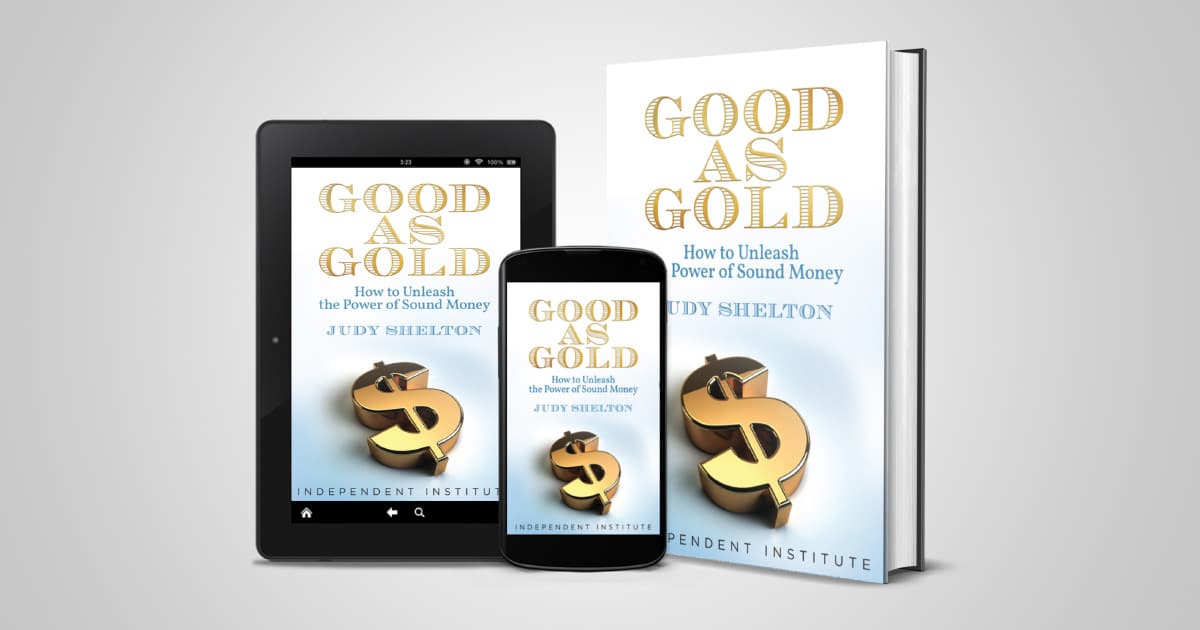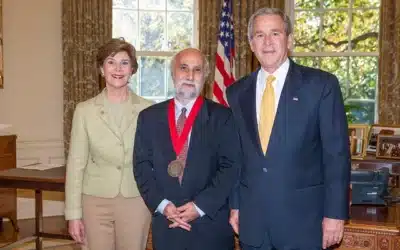Having reviewed multiple books on monetary reform over the past few years, such as Lev Menand’s The Fed Unbound: Central Banking in a Time of Crisis and Brown and Pringle’s A Guide to Good Money: Beyond the Illusions of Asset Price Inflation, I was predictably eager to see what the Independent Institute’s Judy Shelton would have to say on the topic in her new release. Her book, Good as Gold: How to Unleash the Power of Sound Money, does not disappoint.
Indeed, apart from a few passages that left me scratching my head, such as a paragraph length paean to the fiscal vision of Ronald Reagan (huh?), Shelton is to be commended for a truly comprehensive analysis of all the ways the Federal Reserve has failed; destroying the value of the dollar, hopelessly damaging the real economy, creating gross inequality, and badly hurting international trade. Unfortunately, she falls just short of the mark by calling for the reinstitution of a classical gold standard rather than the outright abolition of the Federal Reserve System.
Still, for someone who was nominated for a seat on the Federal Reserve Board of Governors, and is likely on the short-list of nominees during a second Donald Trump administration, this is something substantive at least!
Of course, reasoned and accredited as she is, suggesting a return to a system that reigned over the greatest single period of economic growth in the history of humanity could not but fail to produce the predictable indignation from court intellectuals who will defend the present, corrupt system with every bit of energy and dishonesty they can muster.
As CNN recently sputtered, “Judy Shelton, a controversial economist who has been floated as a potential pick by former President Donald Trump to lead the Federal Reserve if he wins the November presidential election, has proposed a radical solution: The Fed should aim for no inflation at all.”
Imagine not ripping people off!
Clearly, Shelton would be a poor fit for leadership in Washington in CNN’s esteemed estimation. Of course, the author of the piece in question, Matt Egan, a lead business writer for CNN, boasts the predictably underwhelming credentials of a member of the corporate press assigned to opine on such highly specialized topics: a BA in journalism.
Shelton can and does run circles around her critics—many of whom she introduces and delightfully batters with a comprehensive display of her robust mastery of the history of monetary policy regimes, their mechanics, and shortcomings. The primary focus is on our own system, whose defining feature is a failure to have stimulated real growth across the economy while empowering big government and big business by manipulating the money supply via its control over interest rates.
She also mentions every good libertarian’s favorite pocket guide to the government’s monetary misdeeds, Murray Rothbard’s What has Government Done to our Money?
In short, Shelton’s book is a cool two hundred pages of general excellence, ranging from history to theory to current events to future applications, and she deserves a good deal of credit for her tremendous work and best wishes in her future ventures.
However, I would be remiss in recommending the book if I did not at the same time point out where she falls short. For example, Shelton is far too open to the federal government getting involved in digital currencies and too scared of the fake China threat. She writes, “So much is at stake if the dollar becomes vulnerable to displacement as the world’s reserve currency.” She never explains those stakes but worries about creeping Chinese and Russian gains at the margins of the global financial economy.
Most of all, however, Shelton is too convinced of the ability of such a corrupt system to be reformed. She notes those who gain from the current regime consist of large corporations, big banks, the existing billionaire class, and the U.S. government itself. Appeals to right and reason notwithstanding, how, exactly, does she expect such a system to be reformed when the very owners of the political apparatus benefit so handily from the existing arrangement?
She even goes so far as to suggest the possible need for the “temporary suspension of gold convertibility” due to an “unforeseen crisis,” the so-called Bagehot Rule that allows central banks to “solve” short run “liquidity crises,” provided they thereafter return to convertibility “as soon as possible.”
Such crises have everywhere and always been the short road to serfdom—recall, it was that justification that made “greenbacks” legal tender during the Civil War and in the ensuing years.
As the American economist George Selgin has long maintained:
“Like a married bachelor, a rule-bound central banker is a contradiction in terms, for both the background of central bankers and the incentives they confront, combined with the inescapable imperfections of even the most carefully crafted of monetary rules, will inevitably tempt them to tinker with the money stock.”
No, in the end there is only one solution that will really do. In the words of the great and uncompromising Ron Paul, end the Fed!
































